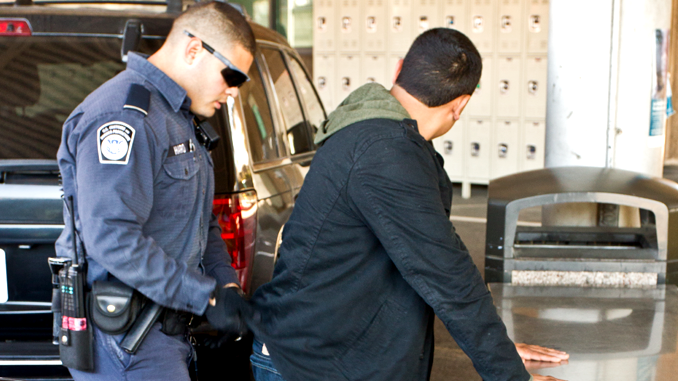
On Monday in Orlando, President Trump told the International Association of Chiefs of Police Annual Convention that he has ordered the attorney general’s office to take pro-active measures in addressing Chicago’s gun violence problem. ABC reports that Trump stated he has suggested the city’s authorities implement “stop and frisk”.
“There’s no reason for what’s going on there,” Trump said, adding that the controversial practice where police are able to stop, question and pat-down individuals they deem suspicious works when it is “properly applied.”
“The crime spree has a terrible blight on that city, and we will do everything possible to get it done,” Trump added. “It works and it was meant for problems like Chicago. It was meant for it. Stop and frisk.”
ABC
Chicago mayor Rahm Emanuel rejected the president’s suggestion saying that he would welcome federal FBI, DEA, and ATF agents to help combat crime but the idea of stop and frisk is out of touch.
“But the failed policies he’s talking about have no place for a city that’s working together with communities, about how to build not only trust, but a collaborative and cooperative relationship,” Emanuel said at a far Northwest Side event to announce more money for sidewalk repairs. “So while resources are always welcomed … the idea of what President Trump’s talking about is not only not welcome, it’s antithetical to what we’re working on. And that is about a strong proactive professional police department.”
Chicago Tribune
Emanuel also cited gun violence statistics that show a reduction since 2016.
While President Trump points to Chicago’s “crime spree”, Chicago PD recently reported there were 102 fewer homicides and nearly 500 fewer shooting victims in the first nine months of 2018 compared with the first nine months of 2017, per ABC. 520 people died in the first nine months of 2017 in Chicago and through September of 2018 there have been 419 homicides.
Trump held up the policy of stop and frisk as the part of the reason New York City’s crime rate plummeted during Mayor Rudy Giuliani’s term, saying the city “went from an unacceptably dangerous city to one of the safest cities in the country. And I think the safest big city in the country. So it works.”
Stop and frisk was deemed to violate the constitutional rights of minorities by a federal judge in 2013 and NYC has since dramatically reduced the use of the policy, from 680,000 in 2011 down to less than 11,000 stops in 2017, ABC reports. Furthermore, civil liberties groups evaluated data from New York City between 2002 and 2017 and found no correlation between the drop in the crime rate and stop and frisk stops.
The deal President Trump alluded to between Chicago and the ACLU required officers to document stops in an effort to halt unconstitutional practices, the Chigago Tribune points out. Critics blame the steep drop in street stops by police for the historic homicide rate in 2016: 4,300 people shot and over 760 killed. Crime experts dismiss that explanation and the ACLU believes that the drop in street stops is because police officers are simply making fewer unconstitutional stops, not deterred from making stops altogether.
Attorney General Jeff Sessions criticized the deal between Chicago and the ACLU, which is now state law, to law enforcement last month.
The agreement, overseen by a retired federal judge, was reached following an ACLU study that found African-Americans were stopped by police at a higher rate than Hispanics and whites. In the settlement, the Chicago Police Department agreed to keep track of all investigatory street stops and protective pat-downs.
The 2015 ACLU of Illinois study found that Chicago police made street stops at a far higher rate than New York City cops did at the height of their controversial stop-and-frisk practices. The ACLU considered suing the Chicago Police Department over the practice, condemning it as racial profiling, but the department agreed to changes that required officers to more thoroughly document their street stops. The changes also were incorporated in a new state law.
Chicago Tribune
In 2016, then-candidate Trump was widely criticized for suggesting a nation-wide stop and frisk law enforcement policy but eventually clarified that he was referring only to Chicago.
